Table of Contents
Why Business Intelligence Matters
- Data-Driven Decision-Making
- Staying Competitive in a Dynamic Environment
- Transforming Industries with BI
- Why BI is Non-Negotiable for Growth
Benefits of Business Intelligence Platforms
- Improved Decision-Making Through Real-Time Insights
- Enhanced Operational Efficiency and Productivity
- Identification of Growth Opportunities and Risk Mitigation
- Better Customer Understanding and Service Personalization
- Scalability for Growing Businesses
Common Applications of Business Intelligence Software
- Performance Monitoring with KPI Dashboards
- Predictive Analytics for Future Trends and Outcomes
- Financial Analysis, Including Budgeting and Forecasting
- Market Analysis and Customer Segmentation
- Streamlining Supply Chain and Inventory Management
- Operational and Workforce Analytics
- Compliance and Risk Monitoring
Challenges in Implementing Business Intelligence Solutions
- Data Silos and Integration Challenges
- Lack of Expertise and Training
- Resistance to Change
- Data Quality Issues
- Security and Compliance Concerns
- Misaligned Expectations
- Scalability Limitations
- Time-Consuming Implementation Process
Key Features to Look for in a BI Solution
- User-Friendly Dashboards and Visualizations
- Scalability and Flexibility
- Integration with Existing Systems
- Advanced Analytics and AI-Driven Insights
- Real-Time Data Processing
- Robust Security and Compliance
- Self-Service Capabilities
- Mobile and Cloud-Based Accessibility
How to Integrate Business Intelligence Tools in Your Organization
- Assess Your Organization’s BI Readiness
- Adopt Best Practices for Data Governance and Integration
- The Role of Leadership and Training in Successful Implementation
- How Lumify360 Streamlines BI Adoption with Power BI Integration
Introduction
Modern businesses generate vast amounts of data daily, from customer interactions to operational metrics. All this data can play a significant role in improving processes, products, and services. The real challenge lies not in collecting data but in transforming it into meaningful, actionable insights that drive growth and innovation. Business Intelligence (BI) software can transform raw data into actionable insights, enabling organizations to make informed decisions, optimize operations, and gain a competitive edge in their industry.
Business Intelligence bridges the gap between raw data and informed decision-making by organizing, analyzing, and visualizing information in ways that empower organizations to act confidently. For example, decision-makers can identify new market opportunities, optimize internal processes, or enhance risk management efforts. In short, BI enables businesses to unlock the full potential of their data.
Adopting and leveraging BI doesn’t end with just installing the right tools. It requires nurturing an organizational culture that prioritizes data-driven strategies. The right solution can facilitate this effort – streamlining decision-making, improving efficiency, and building a competitive edge in today’s fast-paced environment.
At the forefront of this transformation is Lumify360, a platform designed to simplify BI adoption for mid-sized businesses. Lumify360 combines powerful analytics and seamless integration through tools like Power BI to make business intelligence accessible, actionable, and impactful.
In this e-guide, we’ll explore how Power BI integration within Lumify360 can revolutionize your decision-making processes, overcome common implementation challenges, and unlock sustainable success for your organization.
Why Business Intelligence Matters
In a world where data is growing at an unprecedented pace, the ability to turn information into actionable insights can offer a significant competitive advantage. Business intelligence enables organizations to harness the power of their data, empowering them to make informed decisions and adapt to ever-changing market dynamics.
Data-Driven Decision-Making
The days when intuition and experience alone guided business strategies are long gone. Today, organizations thrive by leveraging accurate, real-time data to make decisions. BI tools help bridge the gap between raw data and decision-making by analyzing trends, identifying patterns, and presenting insights in intuitive formats.
For example:
- Retailers can use BI to analyze their customers’ purchasing behavior and adjust inventory levels.
- Banks can rely on BI to detect fraudulent transactions in real-time.
- Manufacturers can improve efficiency by monitoring production metrics and minimizing downtime.
Staying Competitive in a Dynamic Environment
The modern business landscape is becoming increasingly dynamic, with customer preferences, market conditions, and regulatory requirements constantly evolving. BI equips organizations with the tools they need to remain agile and responsive. By identifying market trends early, mid-sized businesses can stay ahead of competitors, seize new opportunities, and mitigate risks.
Consider how BI can:
- Enable predictive insights to forecast market trends and adjust strategies accordingly.
- Provide detailed performance reports to identify underperforming areas and improve them.
- Enhance customer satisfaction through personalized experiences driven by data analysis.
Transforming Industries with BI
Across industries, BI is reshaping how organizations operate and innovate:
- Banking: BI can help banks analyze customer spending patterns, optimize loan approvals, and ensure regulatory compliance.
- Healthcare: BI improves patient outcomes by identifying treatment trends and streamlining operations.
- Manufacturing: BI makes it easier to monitor supply chains, reduce waste, and enhance production quality.
- Retail: Retail businesses can use BI to optimize pricing strategies, predict inventory needs, and boost customer loyalty programs.
Why BI is Non-Negotiable for Growth
Organizations proactively embracing BI today can utilize their resources better, reduce inefficiencies, and achieve long-term success. Without BI, businesses risk falling behind and cannot keep pace with competitors leveraging data to innovate, scale, and excel.
Lumify360 can be a comprehensive solution for mid-sized businesses seeking to drive growth and improve performance. The platform comes with an integrated BI solution, Power BI, tailored for mid-market organizations. It simplifies data analysis and provides real-time insights and visualization, enabling businesses to unlock their full potential in today’s data-driven economy.
Benefits of Business Intelligence Platforms
Business intelligence platforms offer a game-changing advantage by transforming data into actionable insights, driving informed decisions, and unlocking growth opportunities. By leveraging modern BI solutions, businesses gain access to tools that enhance efficiency, improve competitiveness, and deliver measurable value across operations.
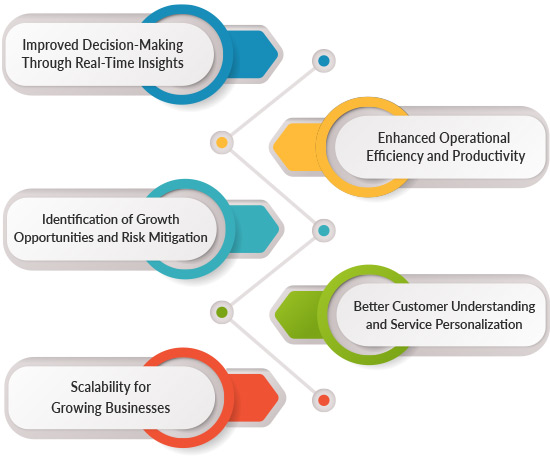
Improved Decision-Making Through Real-Time Insights
BI platforms provide instant access to critical data, enabling leaders to make informed decisions quickly. Real-time dashboards and reports allow businesses to monitor performance as it happens, ensuring they can respond to challenges or opportunities without delay.
- Example: A retail company can use real-time sales data to adjust inventory, preventing overstocking or shortages.
- With predictive analytics, organizations can foresee potential outcomes and proactively adjust strategies for better results.
Enhanced Operational Efficiency and Productivity
BI platforms streamline workflows by automating data collection, reporting, and analysis, reducing the time spent on manual task management. This allows teams to focus on strategic activities rather than routine data processing.
- Integrating data from multiple sources eliminates silos, creating a centralized repository for seamless collaboration.
- Automation of repetitive tasks, such as generating reports or tracking KPIs, saves time and resources.
Identification of Growth Opportunities and Risk Mitigation
BI tools provide deep insights into business operations, uncovering trends and patterns that might go unnoticed. This ability to analyze past and present data helps businesses identify areas for growth while addressing potential risks.
- Growth Opportunities: Visualized dashboards help businesses identify new markets, optimize pricing strategies, and identify underperforming products or services.
- Risk Mitigation: BI enables companies to anticipate possible disruptions, manage supply chain risks, and ensure compliance with regulations.
Better Customer Understanding and Service Personalization
BI platforms provide a 360-degree view of customer behavior, preferences, and needs. Businesses can improve customer satisfaction by analyzing this data through tailored experiences and personalized interactions.
- Example: A healthcare provider can use BI to track patient history and recommend proactive treatment plans.
- Insights from customer segmentation and feedback analysis allow organizations to refine their marketing strategies and deliver superior service.
Scalability for Growing Businesses
Modern BI platforms are designed to grow with the business, offering scalability and flexibility to meet evolving needs. They allow organizations to adapt their analytics capabilities as they expand into new markets or scale operations.
Common Applications of Business Intelligence Software
Business intelligence software empowers organizations to unlock the full potential of their data by transforming it into actionable insights. These versatile and adaptable platforms make them invaluable tools across various industries and departments. Below are some of the most impactful applications of BI software:
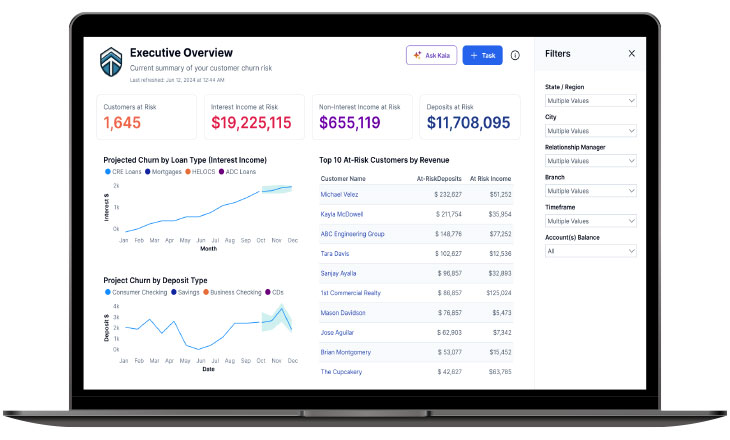
Performance Monitoring with KPI Dashboards
BI software enables organizations to track key performance indicators in real-time through interactive dashboards. These dashboards consolidate data from multiple sources, providing a holistic view of business performance.
- Example: A sales team can monitor revenue growth, sales pipeline health, and conversion rates on a single screen, identifying areas for improvement at a glance.
- Visualizations such as charts, graphs, and heatmaps simplify complex data, enabling quick decision-making.
Predictive Analytics for Future Trends and Outcomes
One of the most transformative features of BI is its ability to leverage historical data about the past to generate predictive analytics for the future. Businesses can forecast future outcomes and prepare proactively by identifying patterns and trends.
- Example: In retail, predictive analytics can forecast seasonal demand, helping optimize inventory levels and prevent stockouts or overstocking.
- Risk management teams can predict potential disruptions and implement contingency plans.
Financial Analysis, Including Budgeting and Forecasting
BI tools streamline financial analysis by providing detailed insights into revenue, expenses, and profitability. They enable businesses to create accurate budgets and forecasts based on historical and real-time data.
- Example: Finance teams can use BI to identify cost-saving opportunities, monitor cash flow, and analyze the impact of market fluctuations on profitability.
- Consolidated financial reports allow for better alignment of resources with business goals.
Market Analysis and Customer Segmentation
BI platforms help organizations better understand their target markets and customer behavior. By segmenting customers based on demographics, buying patterns, and preferences, businesses can tailor their marketing strategies for better results.
- Example: E-commerce companies can analyze purchasing trends to design personalized promotions and recommend relevant products to individual customers.
- Market analysis helps identify emerging opportunities and assess the competition
Streamlining Supply Chain and Inventory Management
BI software enhances supply chain operations by improving visibility into inventory levels, order statuses, and supplier performance. This allows businesses to optimize logistics and reduce operational inefficiencies.
- Example: A manufacturing company can monitor production timelines, identify bottlenecks, and ensure timely delivery of products to customers.
- Real-time inventory tracking prevents overstocking and minimizes carrying costs, while predictive insights ensure inventory aligns with future demand.
Operational and Workforce Analytics
BI tools also play a significant role in optimizing workforce performance and operational efficiency. Organizations can improve operational effectiveness by analyzing employee productivity, absenteeism, and resource allocation.
- Example: HR departments can use BI tools to identify training needs, measure employee engagement, and track workforce trends.
Compliance and Risk Monitoring
In highly regulated industries like banking and healthcare, BI software helps organizations monitor compliance requirements and identify potential risks.
- Example: Banks can use BI tools to ensure adherence to regulatory standards and mitigate fraud through real-time transaction monitoring.
Challenges in Implementing Business Intelligence Solutions
While Business intelligence solutions offer transformative benefits, their implementation comes with unique challenges that organizations must address to ensure successful adoption. Understanding these obstacles is crucial for effectively deploying BI tools and maximizing their value.
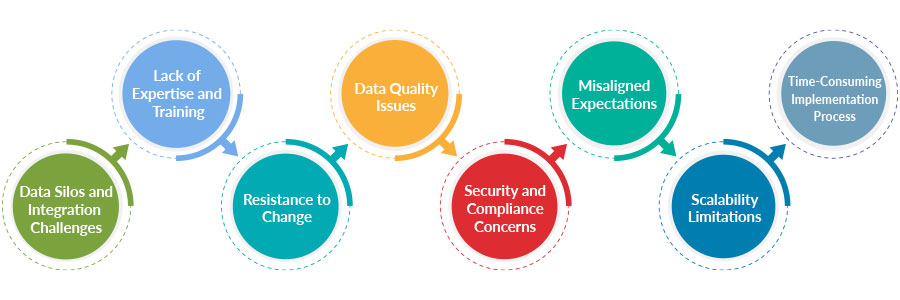
Data Silos and Integration Challenges
Data silos occur when different departments store data in isolated systems, making it difficult to achieve a unified view of the organization. Integrating these disparate data sources into a cohesive BI platform can be technically complex and time-consuming.
- Example: A company with separate sales, marketing, and finance systems may struggle to aggregate data for comprehensive reporting.
- Solution: BI tools with robust integration capabilities, as offered by Lumify360’s seamless compatibility with Power BI and other platforms, can simplify data unification.
Lack of Expertise and Training
Many organizations lack the in-house expertise to deploy and use BI tools effectively. Employees unfamiliar with data analytics may find BI platforms intimidating, leading to underutilization.
- Solution: Investing in user-friendly BI software with intuitive dashboards and providing ongoing training can empower teams to maximize these tools.
Resistance to Change
Implementing BI solutions often involves significant changes to workflows, processes, and company culture. Employees may resist adopting new technologies due to fear of disruption or unfamiliarity with new systems.
- Solution: Clear communication about the benefits of BI, combined with leadership support and phased implementation, can help ease the transition and gain employee buy-in.
Data Quality Issues
The accuracy and reliability of BI insights depend on the quality of the underlying data. If data is incomplete, outdated, or inconsistent, it can lead to inaccurate analysis and flawed decision-making.
- Solution: Establishing robust data governance policies, such as regular data audits and validation processes, ensures that BI platforms can access clean, high-quality data.
Security and Compliance Concerns
With the growing volume of sensitive data being processed by BI platforms, organizations must prioritize data security and compliance with regulations like GDPR, HIPAA, and others.
- Challenge: Data breaches or unauthorized access can damage an organization’s reputation and lead to financial penalties.
- Solution: Modern BI platforms incorporate advanced security features and compliance tools to protect sensitive data and ensure regulatory adherence.
Misaligned Expectations
Organizations sometimes adopt BI solutions without clearly defining their goals or understanding the software’s capabilities. This can lead to unrealistic expectations and disappointment when the platform fails to deliver immediate results.
- Solution: Aligning BI implementation with specific business objectives and setting realistic milestones ensures measurable progress and satisfaction.
Scalability Limitations
Some BI tools may not be equipped to handle the increasing data volumes and complexity as organizations grow. This can lead to performance bottlenecks and limit the platform’s long-term utility.
- Solution: Choosing a scalable BI solution, such as Lumify360, ensures the platform can evolve with the organization’s needs.
Time-Consuming Implementation Process
Implementing BI solutions can be a lengthy process, especially for organizations with complex data infrastructures. From data integration to employee training, the timeline for full deployment can extend beyond initial expectations.
- Solution: Partnering with Lumify360 accelerates the BI implementation process through expert support and pre-configured integrations.
Key Features to Look for in a BI Solution
Selecting the right BI solution is critical to becoming a data-driven organization. A successful BI platform not only enhances decision-making but also integrates seamlessly into your existing ecosystem to deliver maximum value. Below are the key features every organization should evaluate when considering a BI solution.
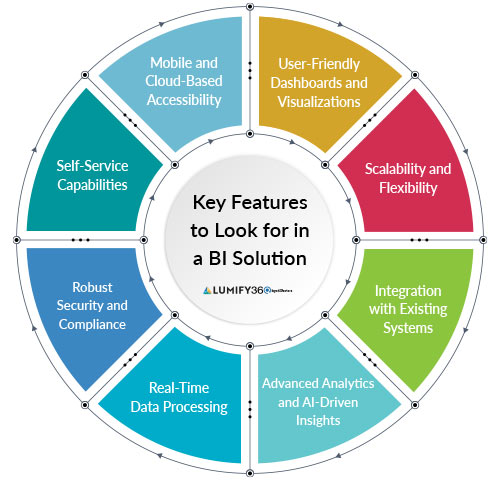
User-Friendly Dashboards and Visualizations
One of the most critical aspects of a BI platform is its ability to simplify complex datasets into intuitive, visually compelling dashboards. These dashboards provide at-a-glance insights that empower users to quickly interpret key metrics and trends. Advanced visualization tools such as heat maps, scatter plots, and layered graphs enrich the user experience.
Ease of use is essential, especially for organizations where not all employees are data experts. An intuitive BI platform should allow users to customize dashboards without relying on IT teams. For example, a sales manager could easily track revenue trends, customer acquisition rates, and regional performance through personalized visualizations. This simplicity accelerates decision-making and fosters widespread adoption of BI tools across departments.
Scalability and Flexibility
Businesses grow and evolve, and their data needs expand in volume and complexity. A scalable BI platform ensures that as data sources multiply and the number of users increases, the system performs efficiently without additional overhead.
Flexibility is equally crucial, allowing the solution to adapt to changes in the business model or organizational structure. For instance, a manufacturing company might initially use BI for operational analytics but later expand its use to include supply chain optimization or IoT data integration. Choosing a platform that scales effortlessly and adapts to new demands can save organizations from costly upgrades or transitions later.
Integration with Existing Systems
A BI solution should act as the central hub for organizational data by integrating seamlessly with existing systems such as CRMs, ERPs, HR platforms, and databases. Poor integration can lead to data silos, fragmented insights, and inefficient workflows. The right BI platform bridges these gaps, providing a unified view of the organization’s performance.
Lumify360’s integration with Microsoft Power BI extends its data analytics functionality while allowing businesses to continue leveraging their current tools. This compatibility ensures that organizations can maximize the value of their existing investments without significant disruptions or additional costs.
Advanced Analytics and AI-Driven Insights
In today’s competitive landscape, businesses need advanced analytics powered by AI to gain a competitive edge. Features like predictive analytics, machine learning models, and anomaly detection enable organizations to uncover hidden patterns and anticipate future trends.
For example, a retail business might use predictive analytics to forecast customer demand during peak seasons, ensuring adequate inventory levels while minimizing costs. Natural language processing (NLP) allows users to query data conversationally, making insights accessible even to non-technical users. These advanced capabilities turn BI platforms into strategic tools for proactive decision-making.
Real-Time Data Processing
Access to real-time insights is a game-changer for industries that rely on agility and quick decision-making. A BI platform equipped with real-time data processing allows organizations to monitor critical metrics as they happen.
For example, a financial institution can track market fluctuations in real-time to optimize trading strategies. At the same time, a logistics company can monitor shipment statuses and delivery timelines to address delays immediately. This ability to act on up-to-date information gives businesses a competitive advantage and ensures they remain responsive to evolving conditions.
Robust Security and Compliance
With increasing concerns around data breaches and regulatory requirements, robust security and compliance features are non-negotiable for any BI solution. These features should include role-based access controls, data encryption, audit trails, and compliance with industry-specific regulations like GDPR, HIPAA, or CCPA.
Security is critical in sectors such as banking, healthcare, and insurance, where sensitive customer data is involved. A BI platform that prioritizes data protection ensures compliance and builds trust with clients and stakeholders, strengthening the organization’s reputation.
Self-Service Capabilities
Gone are the days when only IT teams could extract and analyze data. Modern BI platforms have self-service capabilities that empower employees across all levels to access and interact with data independently. This democratization of data accelerates decision-making, fosters innovation, and reduces the strain on IT departments.
For instance, marketing teams can use self-service BI tools to create campaign performance reports, segment customers, and analyze ROI—all without waiting for IT-generated reports. By enabling users to engage with data directly, businesses can cultivate a data-driven culture throughout the organization.
Mobile and Cloud-Based Accessibility
In a fast-paced business environment, mobile and cloud-based BI solutions ensure decision-makers can access critical insights anytime, anywhere. Mobile BI platforms allow executives to monitor KPIs, review reports, and make informed decisions while on the go.
Cloud-based solutions offer additional benefits, such as cost-efficiency, scalability, and ease of deployment. Organizations no longer need to invest in expensive on-premise infrastructure, and updates or upgrades are seamlessly managed by the service provider. With these features, businesses can ensure their BI platform remains accessible, cost-effective, and future-ready.
How to Integrate Business Intelligence Tools in Your Organization
Successfully integrating BI tools into an organization requires more than just selecting a platform—it involves a strategic approach that aligns technology with business needs, data governance practices, and a culture of data-driven decision-making. Below are the key steps organizations should take to ensure a smooth BI implementation.
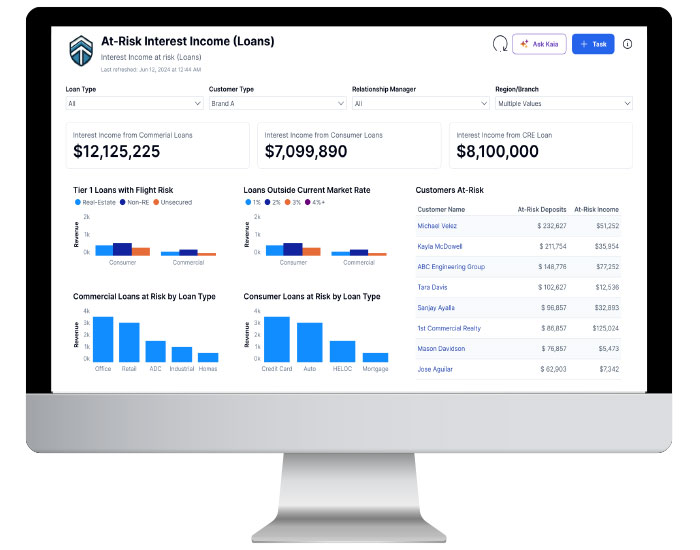
Assess Your Organization’s BI Readiness
Before adopting a BI solution, organizations must evaluate their current data landscape and readiness for integration. This involves assessing data sources, existing analytics capabilities, and internal expertise. Companies should determine:
- The quality and accessibility of their data: Is it structured, clean, and well-organized?
- The key stakeholders who will use BI: Are they executives, analysts, or operational teams?
- The objectives for implementing BI: Is the goal improved decision-making, better risk management, or operational efficiency?
A BI readiness assessment helps organizations understand gaps in their data infrastructure and identify the capabilities they need in a BI solution.
Adopt Best Practices for Data Governance and Integration
One of the biggest challenges in BI implementation is ensuring data accuracy and consistency. Poor data governance can lead to unreliable insights, causing more harm than good. To avoid this, organizations should establish strong data governance policies, including:
- Data Standardization: Ensure that data is formatted consistently across different systems.
- Centralized Data Management: Consolidate data from multiple sources into a single, integrated platform to reduce silos.
- Access Controls: Implement role-based permissions to protect sensitive data while ensuring that employees have access to relevant insights.
- Data Quality Monitoring: Continuously track data accuracy, completeness, and relevance to maintain high-quality reporting.
Integrating BI tools effectively also requires seamless data connections. Modern BI solutions, including Lumify360, offer integration with key business applications like CRM, ERP, and financial software, ensuring a smooth data flow across departments.
The Role of Leadership and Training in Successful Implementation
Even the most advanced BI solutions will fail if employees do not understand how to use them effectively. Organizations must invest in leadership support and employee training to foster a data-driven culture.
- Executive Buy-In: Leadership teams should actively promote BI adoption and highlight its role in strategic decision-making. When top executives use BI dashboards and rely on data-driven insights, it sets an example for the entire organization.
- End-User Training: Employees should receive hands-on training on navigating BI dashboards, creating reports, and interpreting data insights. Training programs should cater to different user levels, such as business leaders, data analysts, and operational teams.
- Change Management Strategies: Many employees may resist transitioning to a BI-driven workflow. Organizations should proactively address concerns by demonstrating how BI tools simplify tasks and improve efficiency. Providing ongoing support and resources can ease the transition.
How Lumify360 Streamlines BI Adoption with Power BI Integration
Lumify360 simplifies BI adoption by integrating with Microsoft Power BI, a widely used analytics tool. This integration allows businesses to:
- Leverage Power BI’s powerful visualization and reporting capabilities within Lumify360’s intuitive interface.
- Connect to multiple data sources, ensuring comprehensive insights across business functions.
- Utilize AI-driven analytics to uncover patterns and trends without requiring advanced data science expertise.
- Benefit from scalable cloud-based deployment, reducing infrastructure costs and IT complexity.
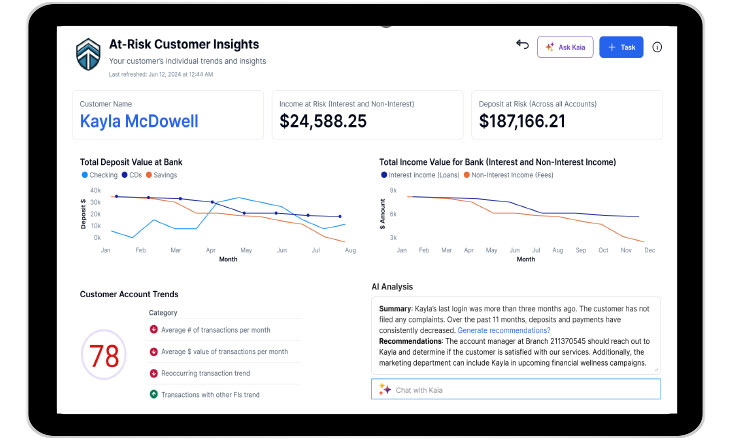
Conclusion
BI technology advancements have revolutionized how businesses access, analyze, and act on data. AI-driven analytics, real-time monitoring, and self-service BI tools allow organizations to move beyond traditional reporting and embrace predictive insights. Solutions like Lumify360 simplify BI adoption, offering seamless integration with Power BI, cloud-based scalability, and intuitive dashboards that empower decision-makers across all levels.
By implementing a centralized BI platform, businesses can eliminate data silos, improve collaboration, and make informed, strategic decisions that drive long-term success. Whether it’s risk mitigation, performance tracking, or customer analytics, the right BI solution ensures businesses stay ahead of emerging challenges and opportunities.
Take the Next Step
Explore how Lumify360 can transform your approach to Business Intelligence. The platform provides seamless integration, AI-powered insights, and real-time analytics tailored to your organization’s needs. It also comes with native Power BI integration, ensuring you always have the information necessary to make timely, data-driven decisions.
Take the first step toward a more innovative, BI-driven strategy:
- Explore Lumify360: Discover how our platform can streamline your data-driven decision-making.
- Request a Demo: SSee Lumify360 in action and learn how it enhances business intelligence.
